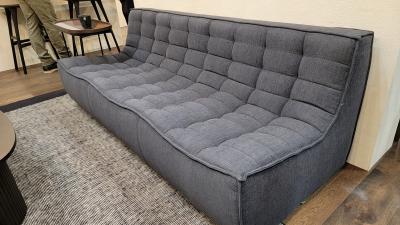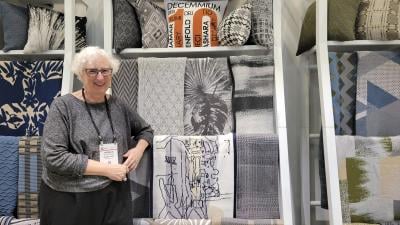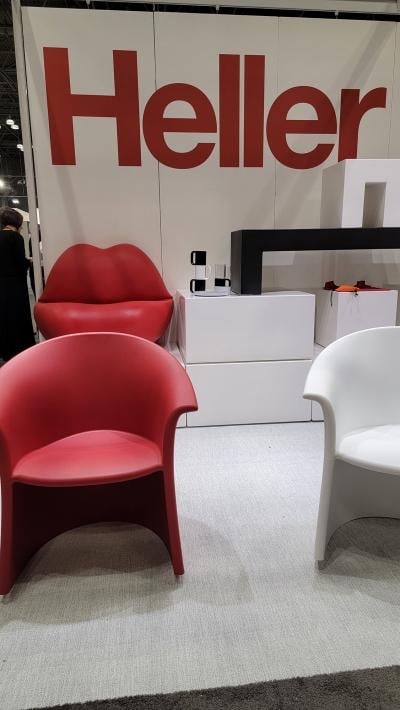NEW YORK CITY — The overarching theme of this years BDNY conference, held this week at the Jacob Javits Convention Center on Manhattan’s West Side, was the increasing demand for sustainable products from hotel suppliers.
A number of booths emphasized their efforts in different ways.
Ethnicraft

At the Ethnicraft booth, a sofa made of repurposed denim from Italian fashion houses was on prominent display. “We're trying to prevent things from going into landfills,” said Anne-Marie Earl, the company’s U.S. communications manager.
Sourcing the material from high-end suppliers is also a way to keep the furniture around longer. “We want these pieces to be passed down from generation to generation,” Earl explained. “We're not super trendy. If you look at our stuff, it's all very detailed and beautiful and nice, but it's going to be able to pass down from year to year and not go out of style.”
Fabric Innovations
Similarly, Fabric Innovations recently launched a line of textiles made of 50 to 70 percent recycled cotton; the remaining percentage is polyester. “They'll take recycled cotton from discarded clothes from all over the globe,” said Erica González, director of operations at Fabric Innovations. The company removes the cotton fibers from the discarded fabric and respins the yarn into something new.
The textiles are also treated to be stain and odor resistant—another step in extending their lifespan, González noted.
Nanimarquina
In August, rug and accessory company Nanimarquina launched three sustainable collections: Re-Rug, made of leftover wool from suppliers; Tiles, a kitchen and bath collection created with 100 percent recycled PET; and the Tres Persian Pouf Outdoor, made of recycled plastic.
The Re-Rug line uses 50 percent of fibers that would otherwise have been thrown out, VP Scott Burns said, as well as 50 percent new fibers. “The beauty of it is, we really don't know what we’ll get,” he said. “It’s all gonna be one of a kind. It just depends on what fibers they're using that day.”

Studio Twist
Michelle Wildenhaus, founder of knit textile company Studio Twist, noted different types of sustainability in hotel fabrics. “There are fibers that are sustainable in their inception, like a natural fiber,” she said. “And then there are ones that are operationally sustainable, which means that these products behave well in the hotel environment.” These products, she said, can be washed at low temperatures, dried and returned to use quickly, reducing the need for multiple versions of the same thing.
“Operational sustainability has the opportunity to have more long-term cost savings,” Wildenhaus noted. “Our pieces, with proper care, can last through an entire renovation cycle—six, seven to 10 years. They're still on the bed, which is wonderful. They're not in landfills.” At the same time, the polypropylene yarn that Studio Twist uses is a byproduct of the gasoline process, minimizing waste from another industry.
Heller Furniture

John Edelman, owner and CEO of Heller Furniture, had a different perspective on repurposed materials. “I don't really believe in using recycled products,” he said, particularly when it comes to plastics. In general, he explained, plastics can be repurposed once and then end up in a landfill, unable to be reused again. If a product is sold using recycled plastics, that likely will be the end of its life cycle.
Heller’s furniture, meanwhile, is made from recyclable polypropylene, and can be reused endlessly as long as it is not mixed with other types of plastic. “For the life of the product, we'll recycle it and turn it into new products,” Edelman said. The company provides a non-fungible token with each product that guarantees authenticity and also provides information on how to return the piece to the company when it’s ready. “We believe that's our answer to long-term sustainability versus short term.”
Global Lighting
The Global Lighting booth had lamps on display from Ay Illuminate. “They travel around the world looking for countries where there is access to natural materials—whether it's bamboo or palm [or] cotton,” Creative Director Rod Ruiz said. The company then designs around the natural resources—“and the craft,” he added, noting that local artisans are best suited to work with materials indigenous to their area.
Ruiz estimated that more than 90 percent of the material in the line would be considered waste. “They save it from being thrown away and they reuse it to make these beautiful fixtures.”
LebaTex
In order to reduce water consumption, LebaTex uses dye sublimation to decorate its textiles rather than directly printing ink onto the fabric. The process, CEO Stacy Garcia explained, prints a small amount of ink onto paper, and then uses heat and pressure to turn the ink into a gas that can be absorbed into the fibers. “And then the paper itself that was used gets recycled,” she added. “A lot of floral industries use that type of paper to wrap their flowers.”
The company is also transitioning away from high-performance finishes with “less than desirable” chemicals in favor of Crypton C-Zero fluorine-free stain-resistant finishes. “I have four children,” Garcia said. “I don't want to leave them with a mess.”
